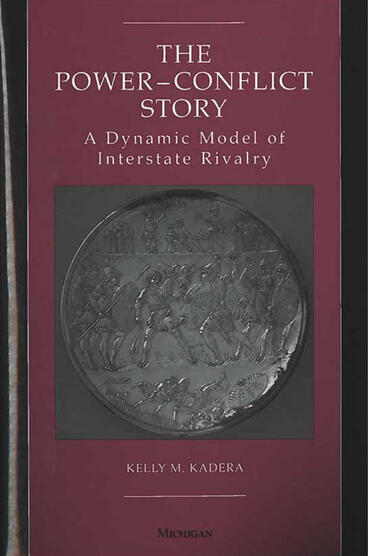The Power-Conflict Story
A Dynamic Model of Interstate Rivalry
Offers a predictive model that explains interstate rivalry
Description
The Power-Conflict Story explains patterns of behavior in major world rivalries since 1816. Kelly M. Kadera carefully lays out the dynamic connections between two rival nations' power relationship and their conflictual interactions with one another. Rivals accumulate power and use conflict as a method of reducing their opponent's power level. But conflict is costly because it invites reciprocation from the opponent who has similar motives. Applying the formal model that she has developed, Kadera makes some interesting and novel predictions about which types of rivals win and what strategies they use. The empirical record on national power levels and interstate conflict convincingly support these predictions. Examples include the rise of the United States as a world power and the corresponding fall of British hegemony near the turn of the last century; Germany's unsuccessful attempt to overtake Britain during the Second World War; and Russia's rivalry with China during the early 1900s.One of the central contributions of the book's explanation of interstate rivalry is the integration of two opposing schools of thought, balance of power theory and power transition theory. This integration is accomplished by the author's dynamic formal model that emphasizes fluctuations in conflict behavior under different power relationships as well as shifts in power levels resulting from natural growth and resource depletion. The formal model and its analysis are presented in a conversational manner, making it accessible to the reader.The Power-Conflict Story will appeal to students and scholars of international relations, world history, formal modeling, applied mathematics, numerical methods, and research methodology.Kelly M. Kadera is Assistant Professor of Political Science, University of Iowa.
Kelly M. Kadera is Assistant Professor of Political Science, University of Iowa.
Reviews
"Kadera's book presents a complicated mathematical argument in clear terms any interested reader will understand. Much of the model is presented graphically, with pains taken to make each picture truly worth a thousand words. The Power-Conflict Story offers the most accessible presentation of formal work I have seen since Bueno de Mesquita and Lalman's War and Reason. . . . [H]er book should be read not only by those interested in the relationship between power and conflict, but also by those interested in the development of formal models and those engaged by research design questions."
- Douglas Lemke, University of Michigan
—Douglas Lemke, University of Michigan, Journal of Politics, February 2003
". . . a compelling tale of the interactions between rival states over time. It not only helps to resolve an ongoing debate in the field by showing that both BOP and PT theories are right under certain conditions, but it also produces a series of new theoretical hypotheses. . . . Such progress in the study of international relations is commendable."
- Sara McLaughlin Mitchell, Florida State University
—Sara McLaughlin Mitchell, Florida State University, Perspectives on Politics, March 2003
Winner: American Political Science Association (APSA) 2002 Best Book Award, Conflict Processes Section
- American Political Science Association

